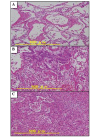Interstitial pneumonia induced by sorafenib in a patient with hepatocellular carcinoma: An autopsy case report
- PMID: 25789013
- PMCID: PMC4356407
- DOI: 10.3892/ol.2015.2934
Interstitial pneumonia induced by sorafenib in a patient with hepatocellular carcinoma: An autopsy case report
Abstract
Sorafenib is a multikinase inhibitor currently approved in Japan for the treatment of unresectable hepatocellular carcinoma. Interstitial pneumonia induced by sorafenib may have a fatal outcome, and therefore, has recently been the focus of many studies. The current report presents an autopsy case of diffuse alveolar damage (DAD) that occurred in a 59-year-old male, who had been treated with sorafenib. The patient had been given sorafenib for six months and had exhibited no respiratory symptoms during this time. However, 19 days after sorafenib treatment was resumed, acute interstitial pneumonia developed. In previously reported cases, the first symptoms of pulmonary toxicity appeared following a limited treatment duration with sorafenib; this was in contrast to the patient in the current study, who developed the first symptoms after eight months. We therefore conclude that physicians must be aware of interstitial pneumonia as a potential pulmonary toxicity associated with sorafenib treatment when treatment with sorafenib is resumed, even after prolonged use. In addition, to best of our knowledge, this is the first case of a postmortem examination reported in patient with interstitial pneumonia induced by sorafenib treatment.
Keywords: diffuse alveolar damage; drug-induced interstitial pneumonia; hepatocellular carcinoma; molecular-targeted agent; sorafenib.
Figures




Similar articles
-
Sorafenib-induced interstitial pneumonitis in a patient with hepatocellular carcinoma: a case report.Gut Liver. 2010 Dec;4(4):543-6. doi: 10.5009/gnl.2010.4.4.543. Epub 2010 Dec 17. Gut Liver. 2010. PMID: 21253306 Free PMC article.
-
Sorafenib-induced acute interstitial pneumonia in patients with advanced hepatocellular carcinoma: report of three cases.Clin J Gastroenterol. 2012;5(4):407-12. doi: 10.1007/s12328-012-0339-9. Epub 2012 Oct 22. Clin J Gastroenterol. 2012. PMID: 24672586 Free PMC article.
-
Interstitial pneumonia induced by combined intraarterial 5-fluorouracil and subcutaneous interferon-alpha therapy for advanced hepatocellular carcinoma.J Gastroenterol. 2004 Aug;39(8):793-7. doi: 10.1007/s00535-004-1375-0. J Gastroenterol. 2004. PMID: 15338375
-
Exceptional serological and radiological response to sorafenib in 2 patients with advanced hepatocellular carcinoma and chronic hepatitis C viral infection: case report and review of the literature.BMC Gastroenterol. 2017 Feb 14;17(1):30. doi: 10.1186/s12876-017-0585-x. BMC Gastroenterol. 2017. PMID: 28193171 Free PMC article. Review.
-
Sorafenib-induced Acute Pancreatitis: A Case Report and Review of the Literature.Intern Med. 2016;55(6):623-7. doi: 10.2169/internalmedicine.55.5712. Epub 2016 Mar 15. Intern Med. 2016. PMID: 26984079 Review.
Cited by
-
Sorafenib in combination with low-dose-homoharringtonine as a salvage therapy in primary refractory FLT3-ITD-positive AML: a case report and review of literature.Int J Clin Exp Med. 2015 Nov 15;8(11):19891-4. eCollection 2015. Int J Clin Exp Med. 2015. PMID: 26884901 Free PMC article. Review.
-
Interstitial Lung Disease Induced by Pazopanib Treatment.Intern Med. 2017;56(1):79-83. doi: 10.2169/internalmedicine.56.7380. Epub 2017 Jan 1. Intern Med. 2017. PMID: 28050004 Free PMC article.
-
Interstitial pneumonia suspected during regorafenib administration and exacerbated by subsequent therapy with lenvatinib for unresectable hepatocellular carcinoma.Clin J Gastroenterol. 2019 Aug;12(4):355-360. doi: 10.1007/s12328-019-00983-x. Epub 2019 Apr 24. Clin J Gastroenterol. 2019. PMID: 31020569
-
[Research progress in toxicology of molecular targeted anticancer drugs].Zhejiang Da Xue Xue Bao Yi Xue Ban. 2015 Sep;44(5):473-8. doi: 10.3785/j.issn.1008-9292.2015.09.01. Zhejiang Da Xue Xue Bao Yi Xue Ban. 2015. PMID: 26713519 Free PMC article. Chinese.
-
Cyclodextrin polymers as nanocarriers for sorafenib.Invest New Drugs. 2018 Jun;36(3):370-379. doi: 10.1007/s10637-017-0538-9. Epub 2017 Nov 8. Invest New Drugs. 2018. PMID: 29116478
References
LinkOut - more resources
Full Text Sources
Other Literature Sources
